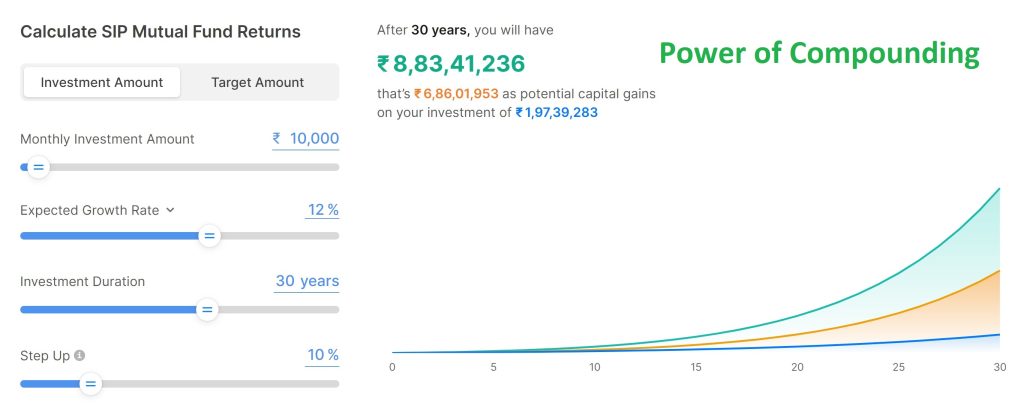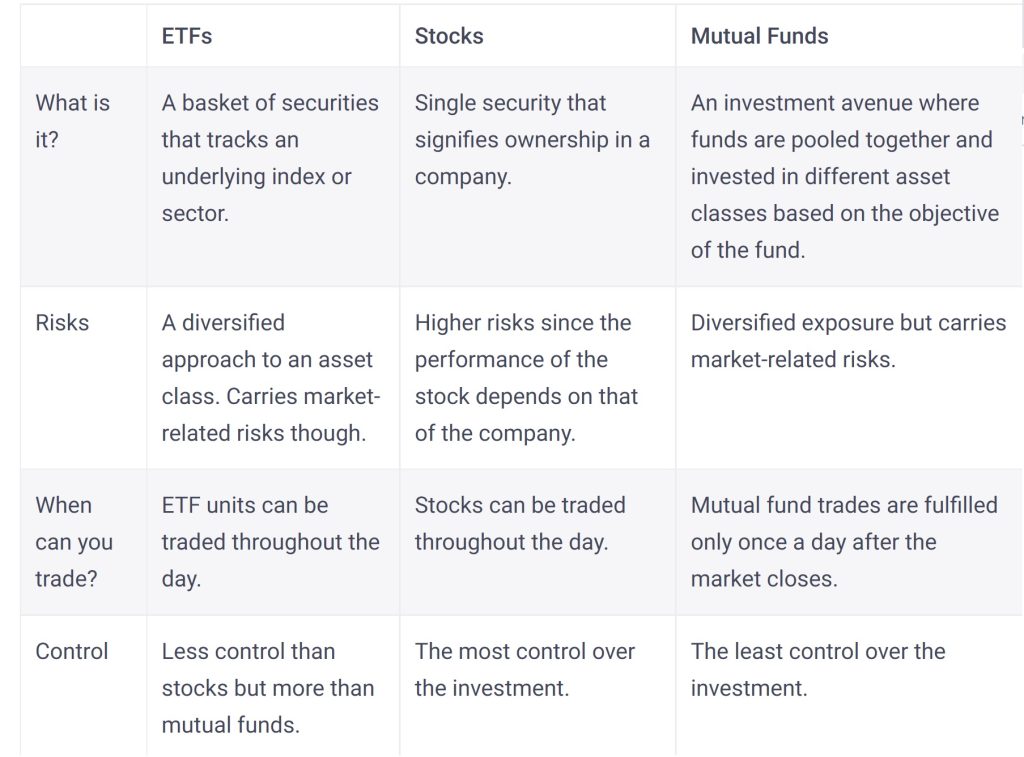In India, 70% people are small investors and they are looking for investment instrument to become rich while working. They save money in FD, insurance and few search in equity market to become rich. It is impossible to beat the markets consistently and therefore it makes more sense to put the money in passive funds for a very long period of time. Passive investing allows to enter into the stock market with basic understanding of investment and indexes.
You can enter into stock market by buying index funds or index ETFs.
Passive investing typically works over the long run.If you are looking at safety and diversification then a passive approach will work bet. Two common ways of investing passively in the equity market are to either opt for an index fund or an index exchange-traded fund (ETF). Both essentially mirror an index.
Passive Investing starts with an Index Fund or ETF
An ETF (Exchange traded fund) is a basket of stocks that tracks an underlying index. For example, a Nifty 50 ETF tracks the composition of the Nifty 50 Index. When you buy a Nifty ETF, you are getting exposure to the 50 stocks that form the Index. What is index fund in India? Index Funds are mutual funds that invest in a specific ETF and managed by mutual fund house. Nifty Index funds and ETF makes power of compounding real.

ETF is listed as same as stocks and Index funds are managed by fund house
Nifty 50 ETFs:
Nifty 50 invests in top 50 stocks in the Nifty Index. It holds ITC, HDFC Bank, ICICI bank, TCS, Kotak, and top 45 companies in the Nifty.
The list of Nifty 50 ETF are SBI Nifty 50 ETF, Nippon India Nifty 50 Bees ETF, ICICI Prudential Nifty 50 ETF, Kotak Nifty 50 ETF, HDFC Nifty 50 ETF, Mirae Asset Nifty 50 ETF, Aditya BSL Nifty 50 ETF, Axis Nifty 50 ETF, Motilal Oswal Nifty, Indiabulls Nifty 50 ETF, Quantum Nifty 50 ETF, Edelweiss Nifty 50 ETF, Invesco India Nifty 50 ETF, IDFC Nifty 50 ETF, LIC MF Nifty 50 ETF, Tata Nifty 50 ETF, UTI Nifty 50 ETF.
You can select the ETF as same as stocks in the NSE/BSE stock broker app and invest in it. It is as simple as ordering in Amazon application.
Nifty Next 50 ETFs :
Nifty Next 50 invests top 50 to 100 companies in the market. It holds Adani, Avenue supermarket, SRF, Dabur India and many more stocks.
Nifty Next 50 or Junior index ETF are Nippon India Junior Bees ETF, UTI Nifty Next 50 ETF, ICICI Prudential Nifty Next 50 ETF, SBI Nifty Next 50 ETF, Aditya Birla Sun Life Nifty Next 50 ETF, Mirae Asset Nifty Next 50 ETF.
Nifty 100 ETFs:
Nifty 100 invests in top 100 stocks in the Nifty Index. It is kind of Nifty 50 index + Nifty next 50 index. You can select this index for better diversification by investing in top 100 companies.
The list of 100 ETFs are ICICI Prudential Nifty 100 ETF, Nippon India Nifty 100 ETF, LIC MF Nifty 100 ETF, SBI BSE 100 ETFI.
Both ETF and Index Funds essentially mirror an index like the NIFTY 50 or the Sensex. But that does not mean that options in passive investing are restricted to only the broader indices. For instance, there are ETFs and Index Funds on various themes like gold, commodities, banks, healthcare, etc. It is also possible to track a set of low-volatility stocks, value stocks, international funds, and so on by investing in ETFs and Index Funds.
There are ETF on Gold, IT, Consumption, Bank and international funds

MidCap EFTs :
Invest in top 100 or 150 midcap stocks in the market. The list Nippon India Nifty Midcap 150 ETF, Motilal Oswal Nifty Midcap 100 ETF, ICICI Prudential Sensex Midcap Select ETF, ICICI Prudential Nifty Midcap 150 ETF.
Bank ETF:
Invest in top bank stocks in the market. It invests in HDFC bank, ICICI bank, SBI bank, Axis bank, BOB, Bandhan and many more bank stocks.
The list of Bank ETF are Kotak Nifty Bank ETF, SBI Nifty Bank ETF, Aditya Birla Sun Life Nifty Bank ETF, Kotak Sensex 30 ETF, Nippon India Nifty PSU Bank Bees ETF, Kotak Nifty PSU Bank ETF, UTI Bank ETF, Edelweiss Nifty Bank ETF, HDFC Banking ETF, ICICI Prudential Nifty Private Bank ETF, ICICI Prudential Nifty Bank ETF, Tata Nifty Private Bank ETF, Axis Banking ETF, SBI ETF Private Bank.
IT index ETFs:
It invests in the software and IT companies in the stocks. It invests in Infosys, TCS, Wipro and Tech Mahindra and many more software companies in India.
List of IT index ETF’s are Nippon India ETF Nifty IT, ICICI Prudential IT ETF, SBI ETF IT.
Infrastructure index ETFs :
It invests in infrastructre stocks. Major investment in L & T, Ultratech cement, ONGC, Apollo hospitals and many more stocks in the infrastructure. Nippon India Nifty Infra Bees ETF
Consumption index ETFs :
This ETF invests in high quality consumption sectors such as paints, consumer food, vehicles and power sectors. It invest companies such as ITC, hindustan unilever, Titan company, Nestle, Avenue supermarkets, Maruti Suzuki and many more companies in consumption sector. Nippon India Nifty India Consumption ETF is consumption index fund in India.
Value/Quality factor ETFs:
It invests in value and quality based stocks in the Nifty index. These ETF try to provide better returns by investing in value and quality stocks in the market.
- Nippon India NV20 ETF
- ICICI Prudential NV20 ETF
- Kotak NV20 ETF
- SBI Nifty 200 Quality 30 ETF
- Edelweiss Nifty 100 Quality 30 ETF
- ICICI Prudential Nifty 100 Low Vol 30 ETF
- ICICI Prudential Alpha Low Vol 30 ETF
- Nippon India Nifty Dividend Opportunities ETF
International ETFs :
You can invest in international stocks by international ETFs. Motilal Oswal NASDAQ 100 ETF, Nippon India Hang Seng Bees ETF
Gold ETFs:
We can invest in gold by ETF. There are more than 10 Gold ETF listed in NSE. The gold ETF are Nippon India Gold Bees ETF, ICICI Prudential Gold ETF, SBI Gold ETF, HDFC Gold ETF, Kotak Gold ETF, UTI Gold ETF, Axis Gold ETF, Aditya BSL Gold ETF, Quantum Gold ETF, IDBI Gold ETF and Invesco India Gold ETF.
You can find respective mutual funds for each ETF. For example, SBI Nifty 50 ETF can be invested by SBI Nifty Index Fund. Invesco India Gold ETF can be invested by Invesco India Gold Fund.
Each ETF has respective mutual funds in the fund house. You can invest in each ETF by mutual fund as well.
So both Index Funds and ETFs offer adequate diversification across tens, hundreds, and even thousands of securities. They both also offer a low expense ratio and, of course, potentially long-term solid returns. While most of the ETFs charge about 0.1-0.5%, index funds have expenses of about 0.75-1.5%.Therefore, it is safe to say that both ETFs and Index Funds have a lot in common.
Index funds and ETFs are good long-term choices for small investors
ETFs are bought in units. So just as you buy 10 or 20 stocks of a company, you need to buy 1 unit, 7 units, 100 units, etc., of an ETF. So if one unit of an ETF is Rs. 40, you have to invest an amount in multiples of 40. Index Funds are generally bought in terms of an amount. So you invest Rs. 100 or Rs. 500 rupees or Rs. 1,000 in an Index Fund. The minimum account is decided by fund house.
ETF can be bought for 50 rupees and Index funds starts with 100 rupees
For instance, a single unit of the ICICI Prudential Bharat 22 ETF can cost you about Rs. 40. So you can invest Rs. 40 and buy just one unit of ICICI Prudential Bharat 22 ETF. However, when buying some units in an Index Fund, all mutual fund companies require a minimum order value of at least Rs. 100 with some AMCs starting higher at Rs. 500 for SIP and lump sum transactions.
You can sell the ETF in the market and redeem the index funds investment whenever you required.
AMC allows the option to invest in index funds via monthly SIP. Systematic investment plans or SIPs are a popular method of investing for retail investors, with monthly inflows consistently. SIP facility allows an investor to invest a fixed amount of money at pre-defined intervals in the selected mutual fund scheme. The fixed amount of money can be as low as Rs. 500, while the pre-defined SIP intervals can be on a weekly/monthly/quarterly/semi-annually or annual basis.
You can schedule to auto invest fixed amount monthly in select mutual fund in SIP
ETF does not have SIP by default. You have to work with your investment broker or advisor to do the job manually. So you are long term investor and investing in equities using the SIP route, then presently, Index Funds might be the right way to go about it.
Long-term investor with long-term goals disciplined approach to invest is Index funds with SIP option
ETF can be bought and sold much like a stock via a trading + demat account for a brokerage fee. It is listed both on NSE and BSE. It has its own symbols and codes and transactions can be carried out anytime during the trading day at the market price determined by demand and supply, unlike mutual funds that can only be transacted at the close of the day.
ETF offers minimum amount and offers you flexibility to buy and sell on trading price.
Overall, choosing between an Index Fund and an ETF is a matter of selecting the appropriate tool for the job. ETFs offer lower expense ratios and greater flexibility, while Index Funds simplify the passive investing with SIP option.
There is no rule to invest only in index funds or ETF. You can select both the option based on your investment goal. You can invest in index funds SIP and invest a part in ETF whenever monthly correction in the market.
You can invest in both Index fund SIP + ETF when market down
ETF with below 50 rupees:
- NIPPON INDIA ETF NIFTY PSU BANK BEES
- MOTILAL OSWAL NIFTY 200 MOMENTUM 30 ETF
- ICICI PRUDENTIAL NIFTY NEXT 50 ETF
- KOTAK NIFTY ALPHA 50 ETF
- MOTILAL OSWAL MIDCAP 100 ETF
- UTI NIFTY BANK ETF
- MIRAE ASSET NIFTY FINANCIAL SERVICES ETF
- ADITYA BIRLA SUN LIFE NIFTY NEXT 50 ETF
- NIPPON INDIA NIFTY PHARMA ETF
- NIPPON INDIA ETF NIFTY IT
- ADITYA BIRLA SUN LIFE BANKING ETF
- ADITYA BIRLA SUN LIFE NIFTY IT ETF
How to invest in ETF :
- Open Demat account using PAN card, Aadhaar card in Zerodha or upstox or any of the stock broker platform. Pay 100 rupees fees and 10 min of your time to open the demat account.
- Link your bank account with stock broker account
- Transfer the money to invest in ETF
- Select ETF and click “Buy”.
How to invest in Index funds :
- Visit zerodha, kuvera, Paytmoney or any one of mutual fund aggregator website
- Provide basic details to register.
- There are 1000’s of representative would help you to open mutual fund account with PAN ID
- Link you bank account, schedule your SIP for the index funds.
#How to get rich with a normal job in India #How to get rich with a normal job #investment #India #mutualfunds #ETF





